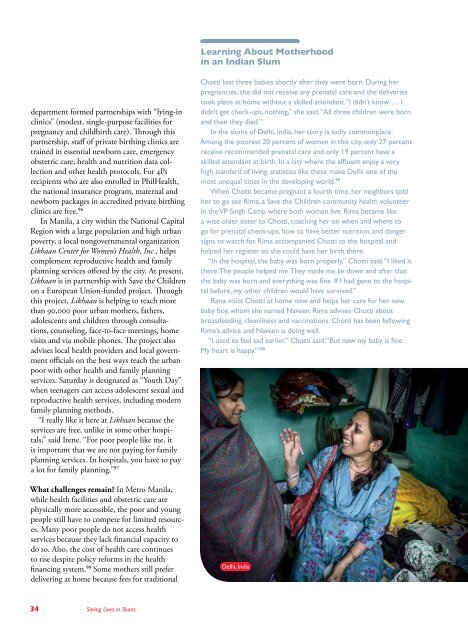sowm_2015__int__africa_full_report_low_res
sowm_2015__int__africa_full_report_low_res
sowm_2015__int__africa_full_report_low_res
You also want an ePaper? Increase the reach of your titles
YUMPU automatically turns print PDFs into web optimized ePapers that Google loves.
Learning About Motherhood<br />
in an Indian Slum<br />
department formed partnerships with “lying-in<br />
clinics” (modest, single-purpose facilities for<br />
pregnancy and childbirth care). Through this<br />
partnership, staff of private birthing clinics are<br />
trained in essential newborn care, emergency<br />
obstetric care, health and nutrition data collection<br />
and other health protocols. For 4Ps<br />
recipients who are also enrolled in PhilHealth,<br />
the national insurance program, maternal and<br />
newborn packages in accredited private birthing<br />
clinics are free. 96<br />
In Manila, a city within the National Capital<br />
Region with a large population and high urban<br />
poverty, a local nongovernmental organization<br />
Likhaan Center for Women’s Health, Inc., helps<br />
complement reproductive health and family<br />
planning services offered by the city. At p<strong>res</strong>ent,<br />
Likhaan is in partnership with Save the Children<br />
on a European Union-funded project. Through<br />
this project, Likhaan is helping to reach more<br />
than 90,000 poor urban mothers, fathers,<br />
adolescents and children through consultations,<br />
counseling, face-to-face meetings, home<br />
visits and via mobile phones. The project also<br />
advises local health providers and local government<br />
officials on the best ways reach the urban<br />
poor with other health and family planning<br />
services. Saturday is designated as “Youth Day”<br />
when teenagers can access adolescent sexual and<br />
reproductive health services, including modern<br />
family planning methods.<br />
“I really like it here at Likhaan because the<br />
services are free, unlike in some other hospitals,”<br />
said Irene. “For poor people like me, it<br />
is important that we are not paying for family<br />
planning services. In hospitals, you have to pay<br />
a lot for family planning.” 97<br />
What challenges remain? In Metro Manila,<br />
while health facilities and obstetric care are<br />
physically more accessible, the poor and young<br />
people still have to compete for limited <strong>res</strong>ources.<br />
Many poor people do not access health<br />
services because they lack financial capacity to<br />
do so. Also, the cost of health care continues<br />
to rise despite policy reforms in the health<br />
financing system. 98 Some mothers still prefer<br />
delivering at home because fees for traditional<br />
Chotti lost three babies shortly after they were born. During her<br />
pregnancies, she did not receive any prenatal care and the deliveries<br />
took place at home without a skilled attendant. “I didn’t know … I<br />
didn’t get check-ups, nothing,” she said. “All three children were born<br />
and then they died.”<br />
In the slums of Delhi, India, her story is sadly commonplace.<br />
Among the poo<strong>res</strong>t 20 percent of women in this city, only 27 percent<br />
receive recommended prenatal care and only 19 percent have a<br />
skilled attendant at birth. In a city where the affluent enjoy a very<br />
high standard of living, statistics like these make Delhi one of the<br />
most unequal cities in the developing world. 99<br />
When Chotti became pregnant a fourth time, her neighbors told<br />
her to go see Rima, a Save the Children community health volunteer<br />
in the VP Singh Camp where both women live. Rima became like<br />
a wise older sister to Chotti, coaching her on when and where to<br />
go for prenatal check-ups, how to have better nutrition, and danger<br />
signs to watch for. Rima accompanied Chotti to the hospital and<br />
helped her register so she could have her birth there.<br />
“In the hospital, the baby was born properly,” Chotti said. “I liked it<br />
there. The people helped me. They made me lie down and after that<br />
the baby was born and everything was fine. If I had gone to the hospital<br />
before, my other children would have survived.”<br />
Rima visits Chotti at home now and helps her care for her new<br />
baby boy, whom she named Naveen. Rima advises Chotti about<br />
breastfeeding, cleanliness and vaccinations. Chotti has been fol<strong>low</strong>ing<br />
Rima’s advice and Naveen is doing well.<br />
“I used to feel sad earlier,” Chotti said. “But now my baby is fine.<br />
My heart is happy.” 100<br />
Delhi, India<br />
34 Saving Lives in Slums




